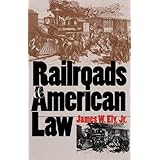
Average Reviews:

(More customer reviews)Are you looking to buy Railroads and American Law? Here is the right place to find the great deals. we can offer discounts of up to 90% on Railroads and American Law. Check out the link below:
>> Click Here to See Compare Prices and Get the Best Offers
Railroads and American Law ReviewJames Ely's Railroads and American Law investigates then relationship between the courts and America's first "big business" and the impact railroads had on the American legal landscape. Ely states in the introduction how he wants to avoid stating a thesis (which seems to be a typical lawyer's ploy to avoid committment) but then establishes themes to support his case.Ely challenges popular myth that railroads literally carried the courts and the lawmakers in their back pockets. The image of 19th century railroads taking land from people and getting all the laws and court decisions in their favor is simply not true. Ely demonstrates how some railroads won court cases while others lost. At times labor or the travelling public won cases while in others railroad interests prevailed. There is no set pattern of cases where one side prevailed over the other. Rates for freight are but one of Ely's examples. Another was railroad mergers and the application of antitrust laws.
This book is not for the casual reader. It is in-depth and at times kind of boring. But legal historians will enjoy the large number of Supreme Court cases referenced and how the author analyses each. I chose this book because I enjoy reading about both topics, railroads and law. Others in this same boat will likely find much offered here.Railroads and American Law OverviewNo enterprise is so seductive as a railroad for the influence it exerts, the power it gives, and the hope of gain it offers.--Poor's Manual of Railroads (1900)At its peak, the railroad was the Internet of its day in its transformative impact on American life and law. A harbinger and promoter of economic empire, it was also the icon of a technological revolution that accelerated national expansion and in the process transformed our legal system. James W. Ely Jr., in the first comprehensive legal history of the rail industry, shows that the two institutions--the railroad and American law--had a profound influence on each other.Ely chronicles how "America's first big business" impelled the creation of a vast array of new laws in a country where long-distance internal transport had previously been limited to canals and turnpikes. Railroads, the first major industry to experience extensive regulation, brought about significant legal innovations governing interstate commerce, eminent domain, private property, labor relations, and much more. Much of this development was originally designed to serve the interests of the railroads themselves but gradually came to contest and control the industry's power and exploitative tendencies.As Ely reveals, despite its great promise and potential as an engine of prosperity and uniter of far-flung regions, the railroad was not universally admired. Railroads uprooted people, threatened local autonomy, and posed dangers to employees and the public alike--situations with unprecedented legal ramifications. Ely explores the complex and sometimes contradictory ways in which those ramifications played out, as railroads crossed state lines and knitted together a diverse nation with thousands of miles of iron rail.Epic in its scope, Railroads and American Law makes a complex subject accessible to a wide range of readers, from legal historians to railroad buffs, and shows the many ways in which a powerful industry brought change and innovation to America.
Want to learn more information about Railroads and American Law?
>> Click Here to See All Customer Reviews & Ratings Now
0 comments:
Post a Comment